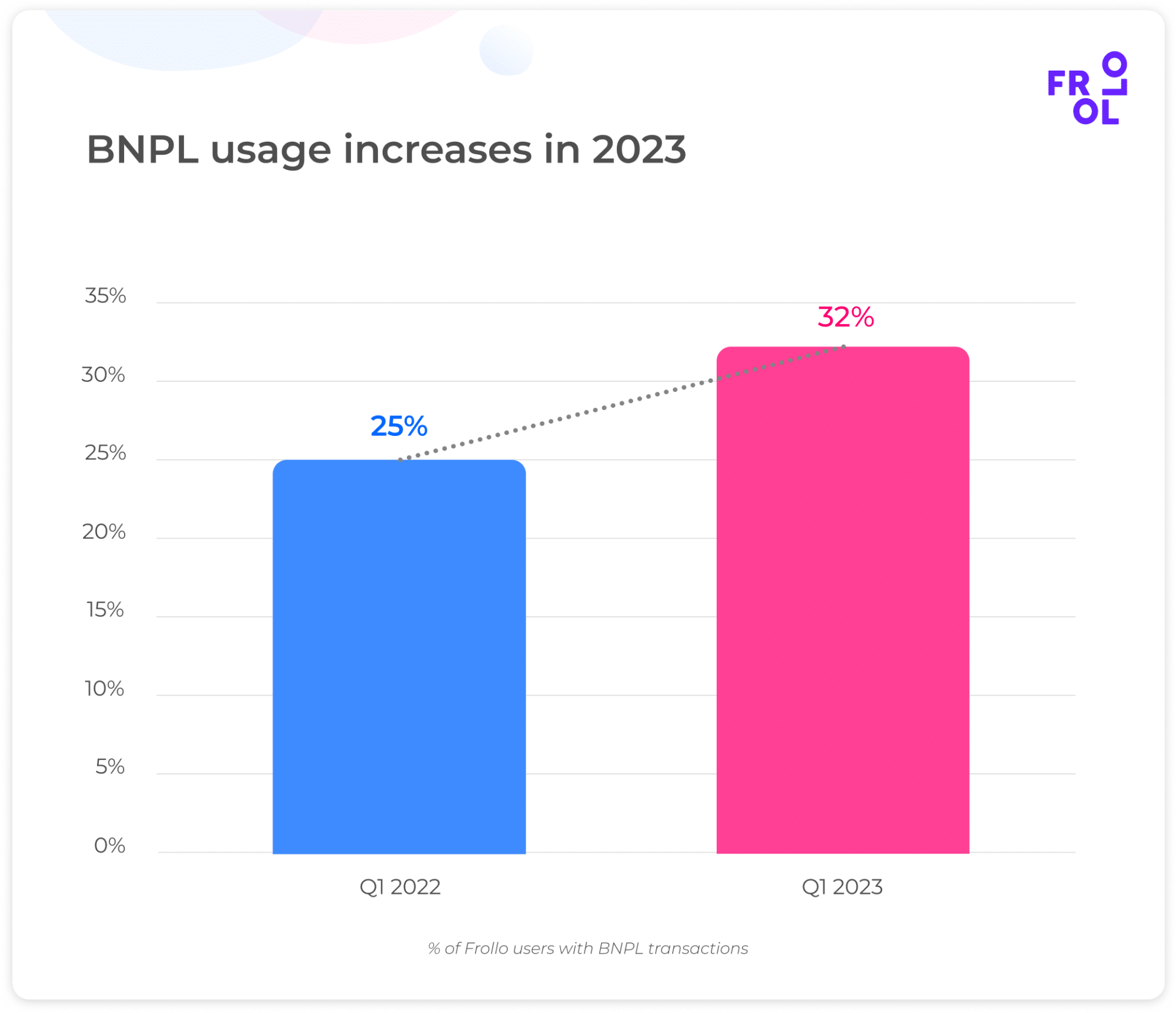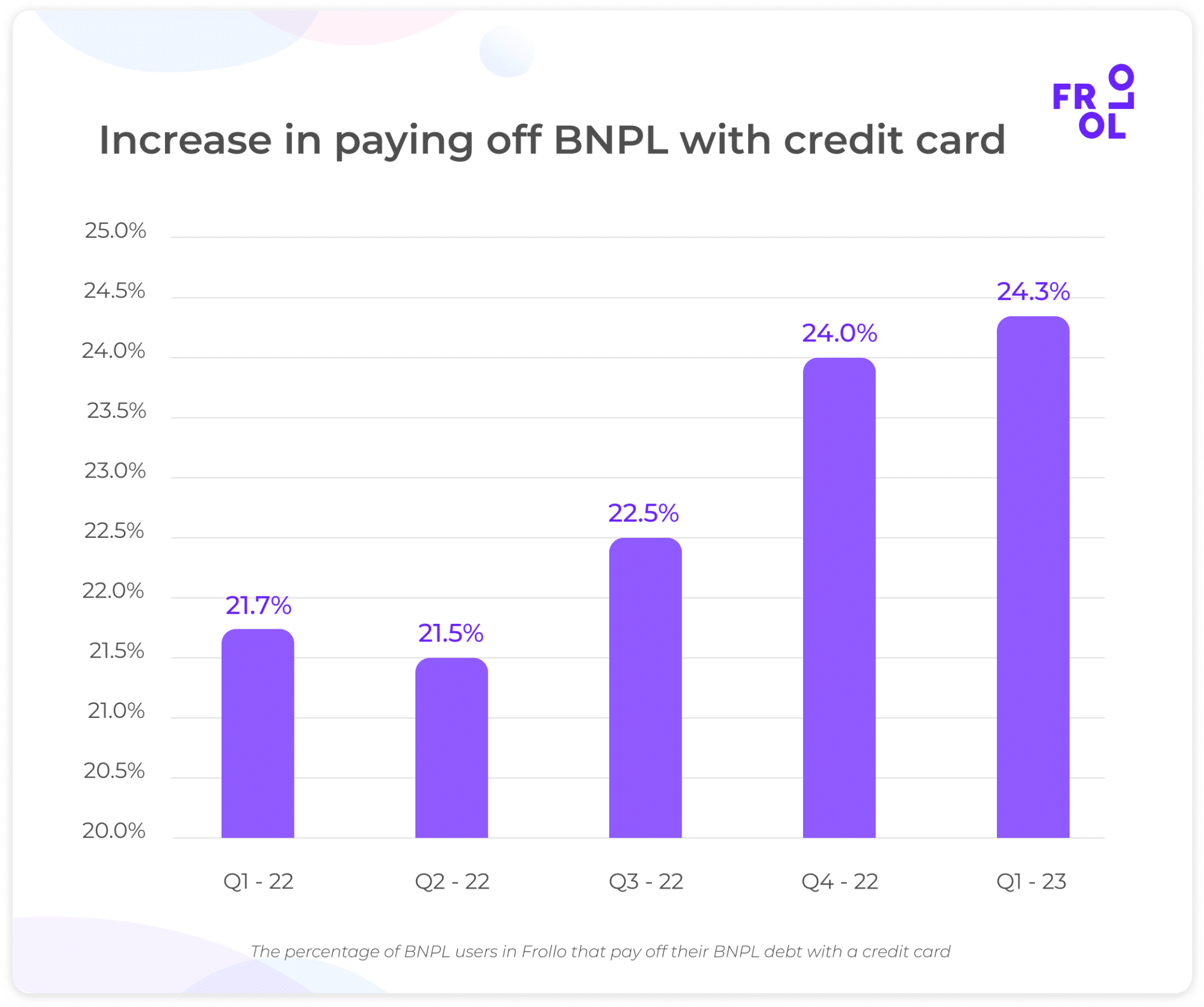Increased usage of unregistered forms of credit like BNPL and Pay Advance carries risks for consumers and lenders
As we head into Q2 2023, the use of buy now, pay later (BNPL) services continues to grow. In Q1 2023, 32% of users accessed BNPL services, up from 25% in Q1 2022. The average monthly spend for BNPL users has also increased by 9% to $420 per month. This data is based on an analysis of 31,372 Frollo app users.
The research also shows that people who use BNPL are more likely to also use Pay Advance (short-term credit) services; 2.3% of BNPL users made at least one payment to a Pay Advance provider in Q1 2023, compared to 1.1% of all users. Although the percentage of people using Pay Advance compared to last year, the average spend on Pay Advance repayments and fees has increased by 60%, to $749 per month. This increase may be due to the continued cost of living pressures and rising interest rates.
While these payment methods can seem like a convenient way to manage expenses, they come with some serious risks for both consumers and lenders.
Most BNPL and Pay Advance providers don’t perform credit checks or report the debt to credit bureaus. These ‘invisible debts’ make it hard for other lenders to assess a borrower’s ability to repay, potentially leading to lending to those who can’t afford it.

Paying credit with credit
Almost a quarter of BNPL users (24.1%) now pay off their BNPL debt with a credit card, which is a 12% increase from the previous year. This practice can potentially create a vicious cycle of debt for consumers, making it difficult to manage their finances effectively.
Baby boomers and Gen X are more likely to pay off their BNPL debt with a credit card. Specifically, 42% of baby boomers and 39% of Gen X BNPL users resort to this method. On the other hand, only 12% of Gen Z BNPL users choose to pay off their debt with a credit card.

BNPL vs credit cards – a generational difference
Younger generations, particularly Gen Z, are more likely to use BNPL; 34% of Gen Z use it compared to 18% of baby boomers. Conversely, credit card use is more popular among baby boomers, with 70% of them using it compared to only 18% of Gen Z.
Interestingly, baby boomers who do use BNPL tend to spend more, with an average monthly spend of $413, while Gen Z’s average monthly spend is $349.

Mitigating risks of invisible debt for consumers and lenders
We’re committed to protect both consumers and lenders from the risks associated with unregulated credit.
Simon Docherty (Chief Customer Oficer, Frollo)
According to Simon Docherty, Chief Commercial Officer at Frollo, invisible debts like BNPL and Pay Advance pose a higher risk for both consumers and lenders: “Since these debts are largely unregulated and unregistered, consumers are less protected. Moreover, due to the lack of visibility, it can be challenging for lenders to assess affordability and meet their responsible lending obligations.“
“Although regulation is underway in the BNPL industry, lenders must still employ the necessary tools and technology to accurately evaluate affordability and risk. This is especially important as our research shows that these services are increasingly popular, particularly among younger generations.”
“Fortunately, Open Banking provides lenders with a secure and complete financial picture of any potential customer, including payment history with BNPL and Pay Advance providers, as part of the credit application process.”
“We’re committed to providing the technology that lenders need to make informed decisions and protect both consumers and lenders from the risks associated with unregulated credit.”
The Frollo Financial Passport is a powerful tool that can help you streamline your lending process and improve the customer experience.
With the Financial Passport, your customers can easily and securely connect their financial accounts and share their financial data with you. This saves you and your customers time and effort, and it gives you a comprehensive and reliable overview of your customers’ financial profiles, including otherwise invisible debts like BNPL and Pay Advance.





